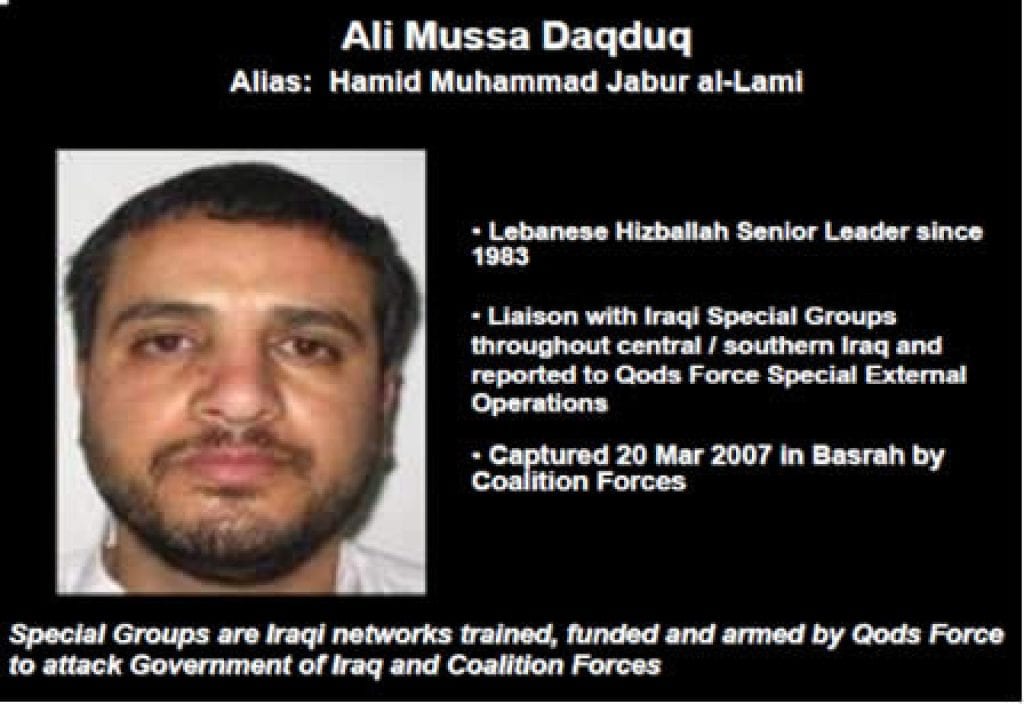
A recent Israeli airstrike in Syria killed Ali Mousa Daqduq, one of Hezbollah’s most wanted military leaders who served as the deputy commander of the Radwan Unit at the time of his death, a senior US defense official confirmed to NBC News. Daqduq, along with Qassem Soleimani, played an instrumental role in establishing Iraq’s Iran-backed Shia militias during the early 2000s. These militias now operate in Iraq, Syria, and Israel.
Few details about Daqduq’s elimination are available. However, on November 10, both Israeli and Arab media reported that Israel Defense Forces (IDF) strikes in Syria killed two prominent Hezbollah commanders: Ali Mousa Daqduq and Salim Ayyash. Despite the reports, the IDF did not comment on the reported targeting.
Over the course of the war, the IDF has carried out numerous targeted eliminations of top Hezbollah commanders. For example, on September 24, an Israeli airstrike in Beirut killed 12 Radwan Force commanders, including its chief, Ibrahim Aqil.
Daqduq played many roles throughout his career with Hezbollah. He was appointed as the deputy commander of the Radwan Force in late September 2024 after the IDF savaged the unit’s leadership in a series of airstrikes that month. The Radwan Force is Hezbollah’s special operations unit tasked with infiltrating the Israeli border and carrying out attacks inside the country against military and civilian targets.
Before assuming a leadership role in the Radwan Force, Daqduq served as the commander of the Golan Unit, a Hezbollah cell formed near the Golan Heights in Syria to operate against Israel. Israel killed his son, Hassan Ali Daqduq, in an airstrike in Syria’s Quneitra governorate in December 2023. Hassan Ali was also a member of the Golan Unit.
Daqduq’s legacy in Iraq
The US government added Daqduq to its list of Specially Designated Global Terrorists in November 2011 for his role in establishing the Iran-backed militias that are responsible for the murder of at least 600 American soldiers in Iraq.
According to the US Treasury Department, “In approximately 2005, Iran asked Hezbollah to form a group to train Iraqis to fight Coalition Forces in Iraq. In response, Hassan Nasrallah established a covert Hezbollah unit to train and advise Iraqi militants in Jaish al Mahdi (JAM) [or Mahdi Army] and JAM Special Groups, now known as Asaib Ahl al Haq [League of the Righteous],” a Mahdi Army faction which is a US listed Foreign Terrorist Organization. Asaib Ahl al Haq has emerged as one of the most powerful Shia terror organizations in Iraq today.
Daqduq worked closely with former Islamic Revolutionary Guards Force—Quds Force commander Qassem Soleimani, Abu Mahdi al Muhandis, the former head of Iraq’s Popular Mobilization Forces and the founder of Hezbollah Brigades, Qais Khazali, the founder and leader of Asaib Ahl al Haq, and Abu Mustafa al Sheibani, the founder of the Sheibani Network and current leader of Kata’ib Sayyid al-Shuhada, to establish a network of militias loyal to Iran.
The US killed Muhandis and Soleimani in an airstrike in Baghdad in 2020.
The Iranian-backed militias that Daqduq, Hezbollah, and Iran spawned are now powerful entities in Iraq and Syria. In Iraq, the militias wield significant political power in parliament. At the same time, the military branches dominate the Popular Mobilization Forces, an official arm of the Iraqi security establishment that reports only to the prime minister.
In 2007, Daqduq was captured by the US military. After 11 months, he was transferred to Iraqi custody and released in November 2012 after being acquitted of terrorism charges. Following his release in 2012, the US added Daqduq to its list of Specially Designated Global Terrorists. He soon returned to Lebanon and was placed in charge of training Hezbollah’s special forces.







